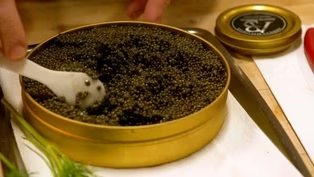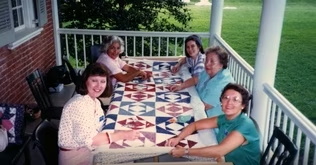
The Franklin 13
Clip: Season 31 Episode 4 | 6m 52sVideo has Closed Captions
The Franklin 13 were a group of horses that were found in terrible condition and saved.
In late 2024, Kentucky Humane Society was called in to Franklin County to rescue 13 horses found abandoned and neglected, confined in muddy pins, and at the brink of starvation. Amongst these horses was a notable name, War Envoy, a previous Breeder’s Cup competitor and once a prized racehorse.
Problems playing video? | Closed Captioning Feedback
Problems playing video? | Closed Captioning Feedback
Kentucky Life is a local public television program presented by KET
You give every Kentuckian the opportunity to explore new ideas and new worlds through KET. Visit the Kentucky Life website.

The Franklin 13
Clip: Season 31 Episode 4 | 6m 52sVideo has Closed Captions
In late 2024, Kentucky Humane Society was called in to Franklin County to rescue 13 horses found abandoned and neglected, confined in muddy pins, and at the brink of starvation. Amongst these horses was a notable name, War Envoy, a previous Breeder’s Cup competitor and once a prized racehorse.
Problems playing video? | Closed Captioning Feedback
How to Watch Kentucky Life
Kentucky Life is available to stream on pbs.org and the free PBS App, available on iPhone, Apple TV, Android TV, Android smartphones, Amazon Fire TV, Amazon Fire Tablet, Roku, Samsung Smart TV, and Vizio.
Providing Support for PBS.org
Learn Moreabout PBS online sponsorshipKentucky is known for its vast array of wildlife, but above all else, the bluegrass state is synonymous with horses.
Now, we celebrate horses better than anybody else, which is why stories like this next one hit so close to home.
In late 2024, the Kentucky Humane Society was called to Franklin County to rescue 13 horses found abandoned and neglected, confined in muddy pens, and at the brink of starvation.
Among these horses was a notable name, War Envoy, a previous Breeders' Cup competitor who was once a prized racehorse.
So why did this happen?
Have the Franklin 13 recovered?
And what can we do to make sure this doesn't happen again?
Let's find out.
[music playing] [music playing] [music playing] It's something unique to Kentucky.
There's no question about that.
But there's something special about a people that give such uncommon reverence to an animal.
And the reason we do that is that we recognize what they have done for us.
And now, the recognition is the thrill and happiness of sport, of racing, and the other horse sports.
And we honor the effort that they give in the same way we honor our human athletes.
We honor these horses.
But I do think it goes beyond that.
I think it is an unspoken recognition and respect for what the horse has done for us over the ages.
And again, Kentucky celebrates that better and more intently than anybody else in the world.
The Franklin 13 were 13 horses that were found to be neglected in Franklin County, Kentucky.
We were called by a state investigator who we had worked with in the past to ask if we were able to take the horses that day.
He was on-site inspecting and knew that they could not stay in those conditions.
We did agree.
We originally were asked if we would take seven.
I think that's all they could see when they first showed up.
But luckily, we took extra trailers and extra hands, and there ended up being 13.
Upon arrival to rescue the Franklin 13, we found that several horses were locked in 10x10 pens and ankle deep or shin deep mud.
Most of them had no food available whatsoever.
So, some of the horses were reaching over the fence to try to eat buds off of trees and stuff to sustain themselves.
Some were in so-so shape, and some were very critical and close to dying from starvation.
One thoroughbred from that case was fairly notable.
He had a notable race history.
His name is War Envoy.
He was actually a horse that raced in the Breeders' Cup, so people did recognize who he was and were very invested in his recovery.
A common misconception is that if a horse was famous at some point in their life or achieved great things, or came from a great pedigree, that they are somehow less susceptible to winding up in a bad situation.
As we found, that's just not true.
A horse having a long list of of accolades or great breeding doesn't necessarily make them any less susceptible to end up in a bad situation.
The good news is that these horrific stories are less and less.
And because they are less and less, they are unique circumstances and we give a lot of attention to them as we should.
The industry, and I think for the first time in history, in a major way, is now totally and intently focused on making sure that this kind of thing becomes impossible.
There's a word that is on the lips of everybody in aftercare now called traceability, and what we've got to do in the years ahead.
And we have the technology to do this, is to be able to identify the location of any horse at any time.
And that is I think is going to be the focus of the industry's attention in the years ahead.
And I think it's a full-court press now that the industry isn't going to tolerate this.
The people in the industry are good people; the vast, vast majority.
And this vast, vast majority of people are not going to let this happen again.
Old Friends is a thoroughbred retirement sanctuary in Georgetown, Kentucky.
It existed since 2003 as not only a sanctuary for retired thoroughbred horses, but as a place for people to come and see those horses, celebrate their lives, and also celebrate the sport of thoroughbred racing.
And the ascendancy of Old Friends kind of mirrored the industry becoming more and more and more serious about making aftercare a pillar of the industry.
And now it is an expectation.
It is a moral expectation that if you are in this business, you have a responsibility for that horse from foaling to forever.
Each horse from the Franklin 13 will be rehabilitated fully and evaluated for their temperament, their training, what sort of adopter would be great for them.
And they will all be offered up for adoption.
These horses should get a second chance because they didn't ask to be brought into this world.
They didn't ask to belong to the people that they belong to.
They didn't ask to get neglected and emaciated.
So, it's our job to take care of them properly.
And while there was a time, and really the majority of our species, we were dependent upon the horse for transportation, for agriculture, for military.
We're dependent on them now in a different kind of way, in an emotional way.
But even though the relationship has changed a bit in that way, the emotional connection is still the same.
And I think that as a Kentuckian, that may very well be the singular greatest gift that Kentucky has given to the world and is giving to the world today.
That is the celebration of that bond between mankind and the horse.
Because the bond is eternal, it continues, and it's celebrated all over the world.
We just do it better than anybody else.
We just do it better than anybody else.
[music playing]
Video has Closed Captions
Clip: S31 Ep4 | 10m 39s | Explore the presence of caviar in Kentucky through America’s Best Caviar. (10m 39s)
Video has Closed Captions
Clip: S31 Ep4 | 5m 34s | A quilting group working together to build community and lift women up. (5m 34s)
Providing Support for PBS.org
Learn Moreabout PBS online sponsorshipSupport for PBS provided by:
Kentucky Life is a local public television program presented by KET
You give every Kentuckian the opportunity to explore new ideas and new worlds through KET. Visit the Kentucky Life website.















